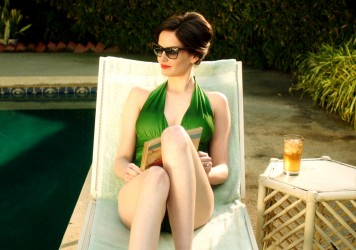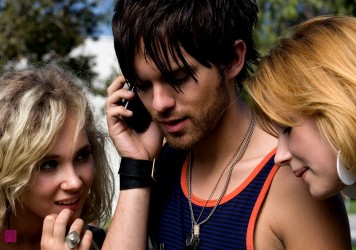Gregg Araki has abandoned his rough-around-the-edges exploitation style in favour of the dream-like textures of David Lynch.
Little League baseball coaches: You can’t live with ’em and you can’t live without ’em. After five stormy years in adaptation purgatory, director Gregg Araki finally got it together to write a screenplay for Scott Heim’s novel, ‘Mysterious Skin’.
Araki claims that it is the first and last time a book has ever received his tears upon its dust jacket. Such melodramatic whimsy is fitting of a film that takes the extreme themes of paedophilia, rape and abduction in small town America and sprinkles them gracefully over its characters like… tears on a dust jacket?
Queer auteur Araki is not a director known for his subtlety. Previous films The Doom Generation and Totally F**ked Up were cinematic nihilism gone haywire, their sole purpose being to shock and disturb with Araki’s own voice front and centre. With Mysterious Skin, Araki has taken a step back. He’s finally stopped saying ‘fuck you’ to society and has decided to concentrate on how society is saying ‘fuck you’ to itself.
Mysterious Skin is a gay psycho drama revolving around the lives of two boys who meet at baseball practice at the age of eight. Swept aside by his hazily ambivalent mother (Elizabeth Shue) Neil McCormack (Joseph Gordon-Levitt) is raped by his baseball coach, leading to him to adopt the lifestyle of a gay hustler. Brian (Brady Corbet) is a dork, decked out in oversized wire-framed glasses and obsessed by the idea that he was abducted by aliens. Both boys are on a quest to study their past and release pent-up emotions they are only beginning to develop.
The performances are good, but not great. And for a film based on such a daring conceit, the performances really needed to be great. Granted, the major dramatic scenes, especially the finale, are commandingly acted and expertly paced. It’s the small, black comic cut-aways that fall flat; the straight-to-camera rhetorical questions and open-ended sentences that Wes Anderson and Todd Solondz do so well. In fact, the entire comic element of the film is slightly ill-conceived. In a scene where Neil picks up a raucous businessman who wants to get the most from his buck, it’s really a joke that only the rent-boys in the audience will be laughing at.
The film contains scenes of paedophilia which are presented with such dreamy elegance, you are left uncertain as to what is actually happening on the screen (and they’re all the more haunting for it). Araki has abandoned the rough-around-the-edges exploitation style in which he usually shoots his films in order to give Mysterious Skin the dream-like textures and ironic juxtapositions of David Lynch (Neil pouring Froot Loops over his head in super slow motion as a metaphor for his rape being the best example). All this coupled with the melancholy (and brilliant) soundtrack supplied by Cocteau Twins mainstay, Robin Guthrie, makes our sympathy for the sad lives these characters lead skyrocket.
Comparisons will be made with Todd Solondz’s forthcoming (and similarly disturbing) Palindromes which uses child actors to present very sensitive ideas on screen. Both films highlight how difficult it is to ‘get right’ a character who has been subject to a paedophilia. With Mysterious Skin the ideas are buried in the character’s emotions so deeply, that it is sometimes difficult to understand the motives behind their reasoning. For all its extravagant storytelling, you’re just not there with them. You sympathise with them, but you don’t like them.
Mysterious Skin’s tone shifts uneasily from the self-consciously subtle (the initial ‘encounter’ with coach) to blatant emotional signposting (the final breakdown). Neil’s never-ending barrage of lecherous clients seem to force the idea of the diversity of sexuality onto the audience. From his initial encounter with a balding snack salesman, you’re counting down the tricks until cocky Neil has his face smashed in with a spanner.
Although Brian’s search for aliens is funny in it’s benign straitfacedness, the final twist will come as no surprise with an ounce of common sense. It’s a well executed film that isn’t entirely convincing. By the final reel, you’re merely left waiting for things to fall into place. If nothing else, it’s serves as a good argument to why we don’t play baseball in Britain.
Published 19 May 2005
If it’s exploding heads and dildo jokes you’re after. No.
Although visually stunning, the acting oscillated too quickly between melodrama and ham, ham, ham.
Way above average, but slightly marred by a Joseph Levitt’s love-it-or-hate-it performance. Read the book: It’s awesome.

Madness, adolescence and nostalgia colour Gregg Araki's poetic mystery starring Shailene Woodley.

The mischievous indie auteur talks about the importance of shoegaze music to his new film, White Bird in a Blizzard.

A highly-fetishised, hyper-surreal teenage Twin Peaks that’s undone by its own excesses and a lack of narrative clarity.